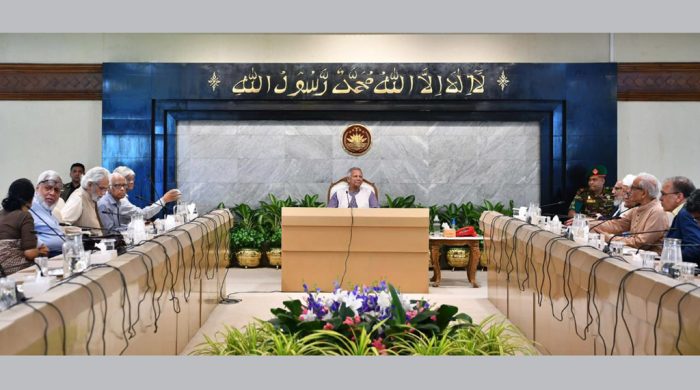Reforms progress reviewed as Yunus sits with body chiefs

- Update Time : Tuesday, November 5, 2024
- 15 Time View

The commissions, formed by the interim government to reform different systems and organisations, are now proceeding at full speed to complete their tasks as soon as possible.
Chiefs of the reform bodies on Monday updated interim government chief adviser Muhammad Yunus about their progress, findings and ideas at a meeting held at the Chief Adviser’s Office at Tejgaon in Dhaka city.
Electoral reform commission chief Badiul Alam Majumdar said at the meeting that measures were underway to ensure the voting rights of Bangladeshi expatriates and work on postal ballots was progressing to enable the voters to exercise franchise through post.
Having mentioned that the voter list was being adjusted with the national identity card database, he said that his commission was taking effective measures to facilitate women’s participation in the electoral process.
Besides maintaining regular communication with the stakeholders, their suggestions were also being collected through using digital platforms, he added.
Public administration reform commission chief Abdul Muyeed Chowdhury informed the chief adviser at the meeting that besides proceeding with the work at full speed, his commission started seeking stakeholders’ opinion through website.
The commission members visited the district and upazila levels and exchanged views with people, Muyeed said.
The commission members informed the chief adviser that they were currently exchanging views with the representatives of various public administration cadres and hoped that they would be able to submit their report within the stipulated timeframe, the chief adviser’s press wing said.
Highlighting the progress of the initiatives of the police administration reform commission, its head Safar Raz Hossain said that the reform commission had already held 14 meetings, including four meetings with stakeholders.
The police reform commission had also posted a questionnaire on the website seeking public opinion, he said, adding that it was scrutinising the proposals made to amend some laws and rules.
The commission was also preparing some proposals to simplify some processes, he added. Safar said that work was also underway on a proposal to change the method and use of force for mob control, while several sections of the Criminal Procedure Code 1898 were being examined to check their need for undergoing change.
Interim government chief adviser at an address to the nation on September 11 announced the six reform commissions tasking them with proposing reforms in six key sectors and organisations.
The commissions have been formed in the backdrop of the interim government’s assuming power on August 8 after Sheikh Hasina had resigned as prime minister and fled to India on August 5 amid a student-led mass uprising, ending the 15-year long autocratic regime led by Awami League.
In his September 11 address, Yunus said that his government wanted effective reforms to start a new journey as a nation.
As the initial step towards reforms, the six commissions were formed, he said.
Later, six prominent citizens were appointed to lead the commissions that officially began their activities from the last month.
The six commissions are—election system reform commission, police administration reform commission, judiciary reform commission, Anti-Corruption Commission reform commission, public administration reform commission and constitutional reform commission.
All the commissions were asked to place their reports by December 31.
The government later formed four more commissions—mass media reform commission, health affairs reform commission, labour rights reform commission, and women affairs reform commission.
On September 19, Yunus held the first meeting with the reform commission chiefs.
With a provision to have a student representative in each commission, so far only the constitutional reform commission out of the first six commissions has named its student member.
The rest five commissions have yet to name their student representatives although over a month has already passed out of 90 days allotted to complete their tasks.
Separate gazettes have, so far, announced the names of 7–9 members of each commission, mentioning the student representative’s name for only the constitutional reform commission.















